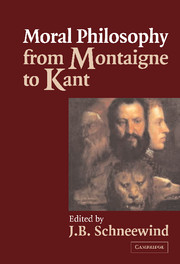Book contents
- Frontmatter
- Contents
- Preface
- Acknowledgments
- Foreword to the One-Volume Reprint
- Introduction
- PROLEGOMENA: SOME QUESTIONS RAISED
- PART I REWORKING NATURAL LAW
- PART II INTELLECT AND MORALITY
- PART III EPICUREANS AND EGOISTS
- PART IV AUTONOMY AND RESPONSIBILITY
- The Earl of Shaftesbury
- Francis Hutcheson
- Joseph Butler
- David Hume
- Christian August Crusius
- Richard Price
- Jean-Jacques Rousseau
- Thomas Reid
- Immanuel Kant
- Supplemental Bibliography
Christian August Crusius
Published online by Cambridge University Press: 05 June 2012
- Frontmatter
- Contents
- Preface
- Acknowledgments
- Foreword to the One-Volume Reprint
- Introduction
- PROLEGOMENA: SOME QUESTIONS RAISED
- PART I REWORKING NATURAL LAW
- PART II INTELLECT AND MORALITY
- PART III EPICUREANS AND EGOISTS
- PART IV AUTONOMY AND RESPONSIBILITY
- The Earl of Shaftesbury
- Francis Hutcheson
- Joseph Butler
- David Hume
- Christian August Crusius
- Richard Price
- Jean-Jacques Rousseau
- Thomas Reid
- Immanuel Kant
- Supplemental Bibliography
Summary
Introduction
Christian August Crusius was born in 1715. He studied theology, philosophy, and other subjects at Leipzig, one of the more advanced of the enlightened German universities, and in 1740 began to teach philosophy there. Between 1744 and 1749 he published his main philosophical works. Among them are Anweisung, vernünftig zu leben (Guide to Rational Living) (1744), Entwurf der nothwendigen Vernunft-Wahrheiten (Sketch of Necessary Rational Truths) (1745), and Weg zur Gewissheit und Zuverlässigkeit der menschlichen Erkenntniss (Way to the Certainty and Adequacy of Human Knowledge) (1747). Thereafter he wrote only on religious and theological topics. Crusius moved to the theological faculty while keeping a position in the philosophical faculty. A popular teacher, he had a successful university career and achieved substantial recognition outside the university. He died in 1775.
The dominant philosophy in Protestant Germany during Crusius's lifetime was that of Christian Wolff. Crusius, a strongly Pietist Lutheran, was opposed to it on religious grounds and came to be known as its most acute and effective critic. As a Pietist he saw personal religious experience and feeling as more important than institutional practices and rituals, and he held that simple and uneducated people could have a richer religious life than could those who were sophisticated and learned. Against Wolff's intellectualism, therefore, which taught that humans are autonomous and which held that the human good consists of the endless increase of knowledge, Crusius stressed the importance of deliberate obedience to God's laws, of which everyone could be aware through feeling, and of reliance on God to look after one's well-being.
- Type
- Chapter
- Information
- Moral Philosophy from Montaigne to Kant , pp. 568 - 585Publisher: Cambridge University PressPrint publication year: 2002

